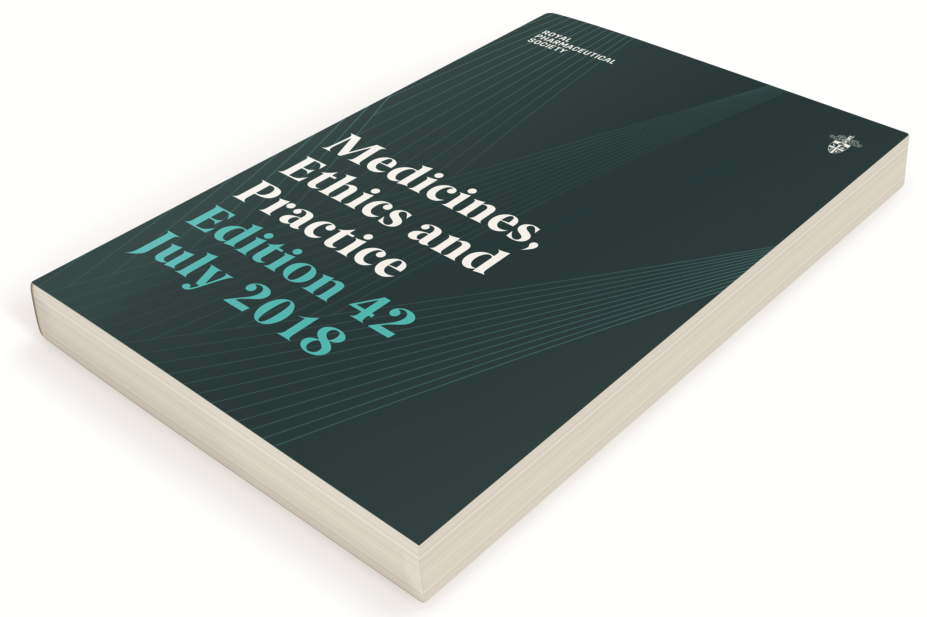
Royal Pharmaceutical Society
The latest edition of Medicines, Ethics and Practice (MEP) features new sections on dispensing errors, autoadrenaline injectors for schools and the responsible pharmacist.
MEP 42, which was sent to UK-based Royal Pharmaceutical Society (RPS) members with the July 2018 issue of The Pharmaceutical Journal, also features a fresh design and layout.
“After we published MEP 41, in July 2017, we ran a member survey to get feedback on the book,” said Wing Tang, senior professional pharmacist for standards and professional support at the RPS, who edited the new edition.
“One of the strongest messages we got from that was that people wanted more colour, improved diagrams and better tables. So we’ve taken that on board. It’s still the same MEP, with familiar content, but we hope the new design and colours will improve readers’ experience. We think it’s in line with what members asked for.”
Two of the three new sections have been added in response to changes in legislation. The first, ‘Making things right when there’s been a dispensing error’, was introduced following the passing into law of a defence against inadvertent dispensing errors. The law, which came into effect on 16 April 2018, protects community pharmacists from prosecution in the event of an inadvertent mistake during dispensing.
“Our focus in MEP is to encourage management of an inadvertent dispensing error defence with professionalism,” said Tang. “It’s not about defence criteria, it’s about responding to an error in the right way and, in doing so, naturally being able to use the defence.”
For readers who need further guidance, the section signposts to the RPS’s ‘Quick reference guide’ to the defence.

Source: MAG / The Pharmaceutical Journal
Wing Tang, senior professional pharmacist for standards and professional support at the Royal Pharmaceutical Society, said: “Our focus in MEP is to encourage management of an inadvertent dispensing error defence with professionalism”
‘Supply of autoadrenaline injectors to schools’ is another new section introduced following a change in the law. “In October 2017, the government published legislation allowing schools to obtain adrenaline from pharmacies,” said Tang. “At the time, we prepared a quick reference guide on the legislation and we’ve incorporate some of that content into MEP 42. Having that information to hand means that if pharmacy teams are approached by schools asking for adrenaline, they’ll know where they stand in relation to supplying it.”
The final new section, ‘The responsible pharmacist’, will be familiar to many readers. Until 2010, responsible pharmacist guidance was curated by the then Royal Pharmaceutical Society of Great Britain (RPSGB), and always had a place in MEP. When the RPSGB diverged into the RPS and the General Pharmaceutical Council (GPhC), the latter took over custody of the guidance and made some modifications. The GPhC’s guidance was included in the MEP as an appendix; but in 2017, the GPhC withdrew the guidance which, Tang said, “left a bit of a gap that we’ve decided to fill”.
“The guidance has continued to evolve — and will again if the responsible pharmacist and superintendent proposals come to fruition — but it will be broadly familiar,” he added.
There have been some other changes. The section on ‘Dispensing valproate for girls and women’ has been revised to reflect new MHRA licensing rules, which require female patients of childbearing potential to follow a pregnancy prevention programme when taking the medicine. ‘A just culture’, which explores how to create a workplace culture that promotes safe and effective care without undue fear of punishment, now features a modified form of the NHS’s “just culture pathway”. “You follow the pathway when something’s gone wrong and it directs you to the appropriate action,” said Tang. “The pathway focuses on what the organisation needs to do so that similar mistakes don’t happen in future.”
Each annual update of MEP is undertaken with support from an advisory panel of volunteers. Tang offered his thanks to the 2018 panel for sharing their “time and expertise”, and added that the RPS is keen to hear from members interested in joining the panel. Members from any sector and careers stage are welcome, from students to retired pharmacists, and the RPS is particularly keen to ensure the panel reflects the geographical diversity of the UK. Members who would like to find out more about joining the panel are invited to contact the RPS on support@rpharms.com
MEP can be purchased from the Pharmaceutical Press store. It is also available as a PDF download from the RPS website.

